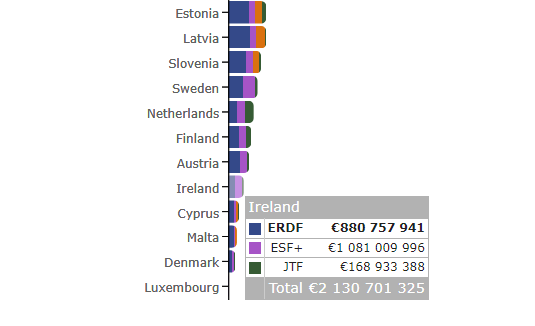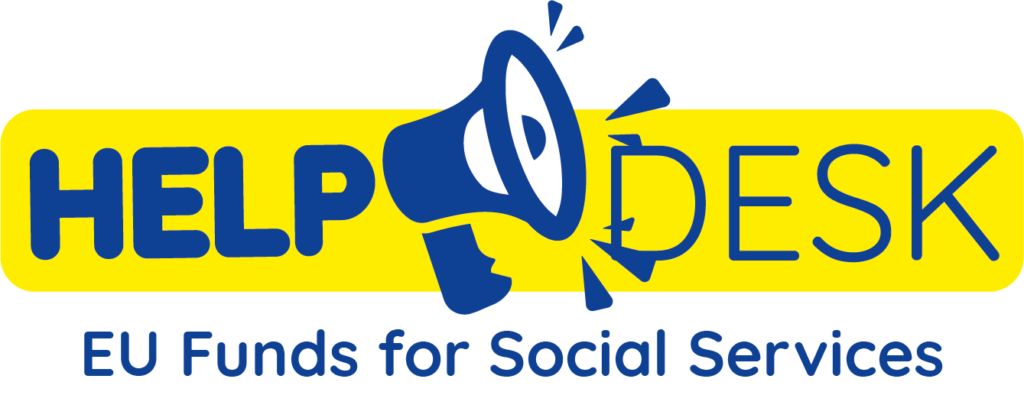Partnership agreement EC – Ireland 2021 - 2027
The partnership agreement (PA) with Ireland covers 5 funds: the European Regional Development Fund (ERDF), the European Social Fund+ (ESF+), the Cohesion Fund, the Just Transition Fund (JTF) and the European Maritime, Fisheries and Aquaculture Fund (EMFAF). This Country Sheet will focus on ESF+ and ERDF.
The Commission published its Partnership Agreement with Ireland for the period 2021-2027, which accounts for 2 130 701 325 EUR.
The Partnership agreement follows the five policy objectives of the 2021-2027 EU cohesion policy :
- A more competitive and smarter Europe (PO 1)
- A greener, low carbon transitioning towards a net zero carbon economy (PO 2)
- A more connected Europe by enhancing mobility (PO 3)
- A more social and inclusive Europe (PO 4)
- Europe closer to citizens by fostering the sustainable and integrated development of all types of territories (PO 5)
ESF+ accounts for €1.8 billion EUR, €508 million from the EU and €573 million from the Government of Ireland. The programme has two different rates of co-financing. As ‘more developed’ regions, the Southern and the Eastern & Midlands regions will receive 40% in EU co-financing, while as a ‘transition’ region the North-Western region will receive 60% in EU co-financing.
ERDF accounts for 880 757 941 EUR. The co-financing rate varies by region. Ireland will have three NUTS 2 regions in the 2021-2027 round, with two different rates of co-financing. As ‘more developed’ regions, the Southern and the Eastern & Midlands regions will receive 40% in EU financing, while as a ‘transition’ region the North-Western region will receive 55% in EU financing.
The PA was formally approved by the European Commission in October 2022 and approved by the Government of Ireland in November 2022.

Source: https://cohesiondata.ec.europa.eu/cohesion_overview/21-27 as on 13 July 2023
1. ERDF and ESF+ 2021 – 2027
1.1 Current state of affairs
The 2020 Country Report for Ireland mentioned that the relatively low levels of R&D investment are a continuing concern. Moreover, the country specific report notes the significant differences in regional competitiveness as a challenge. Hence, Cohesion Policy will focus on enhancing Research and Innovation capacities, enhance the competitiveness and growth of Irish-owned SMEs, strengthen innovation performance, prioritise smart specialisation areas, support clusters, and address regional differences in the research and development intensity.
1.2 ESF+ and ERDF complementarity
An independent needs analysis for ERDF /ESF+ has identified complementarities between particular areas of ERDF and ESF+ funds, notably to support the transition to a climate neutral economy. For example, ensuring that the labour market has the skills required for green transition, including retrofitting programmes, is likely to require upskilling and training which could be supported by ESF+.
There is also complementarity when it comes to labour market and sectoral initiatives to respond to the impact of Covid-19, initiatives to address access to employment for underrepresented groups, programmes to enhance skills and lifelong learning, supports to improve the quality and affordability of childcare and measures to tackle poverty and promote social inclusion.
1.3 ERDF 2021 – 2027
The 2020 Country Report for Ireland mentioned that the relatively low levels of R&D investment are a continuing concern. Moreover, the country specific report notes the significant differences in regional competitiveness as a challenge. Hence, Ireland will invest €396 million from the European Regional Development Fund (ERDF), which will contribute to the developing and enhancing of research and innovation capacities and the development of advanced technologies. There will be a focus on Higher Education Institutes, especially on Technological Universities, strengthening the link between academia and industry. The aim is to create stronger regional innovation ecosystems promoting the dissemination of innovation and fostering enterprise innovation and entrepreneurship.
The Country Report Ireland 2020 acknowledged that the publication of the Climate Action Plan 2019 represented “a much needed breakthrough and a stepping stone in the transition to a climate neutral and circular economy” but stated that greenhouse emissions in the transport, building and agriculture sectors are high and on a rising trend. The Cohesion Policy will contribute to improved energy efficiency, lower greenhouse gas emissions and reduced risk of energy poverty arising from renovations to owner-occupied residential homes of lower income households (Policy Objective, PO 2). Moreover, ERDF will enhance sustainable growth, competitiveness and job creation in SMEs (PO 1).
Furthermore, ERDF will contribute to foster social, economic and environmental development, culture, natural heritage, sustainable tourism, and security in urban areas through integrated urban regeneration action plans These actions will be targeted towards key towns and regional growth centres in the two NUT2 regions in the programme area (PO 5).
- 2021IE16RFPR001 – Northern and Western Regional Programme 2021-2027 transition region, union contribution: 130 238 539 EUR (technical assistance Article 36(5) CPR included)
- 2021IE16RFPR002 – Southern, Eastern and Midland Regional Programme 2021–2027, more developed region, union contribution: 265 477 482 EUR (technical assistance Article 36(5) CPR included)
1.4 ESF+ 2021 – 2027 (PO 4)
Ireland’s 2019 Country Specific Recommendation recommended active integration support and upskilling, in particular for vulnerable groups and households with low work intensity. Hence, ESF+ in Ireland aims to improve access to employment for all and in particular disadvantaged groups who face greater challenges in the labour market.
508 million EUR of the ESF+ Programme aims to deliver on the European Pillar of Social Rights Action Plan and contribute to Ireland’s progress on its 2030 national headline targets. ESF+ will contribute to the headline target of an employment rate of 78.2% by 2030 through labour market training and activation measures for all jobseekers with a focus on younger workers and those underrepresented in the labour market.
Annex D of the 2019 Country Report noted that there is a need for more targeted skills, as well as basic skills development and lifelong learning policies, including digital skills. Moreover, the 2020 CSR suggest to support employment by developing skills. This is why ESF+ will contribute to the second headline target of adult participation in learning of 64.2% by 2030, through upskilling measures and access to education. Through broader opportunities for continuous upskilling and reskilling in areas of high skill demand, including green and digital skills, this headline target will be aimed for. There will be a focus on upskilling in the childcare sector to increase access to affordable, quality childcare. There will also be a focus on increasing basic literacy, numeracy and digital skills. ESF+ will also support inclusive education, to increase participation of disadvantaged groups, including learners from diverse backgrounds.
ESF+ will contribute to the headline target of an at risk of poverty and social exclusion rate of 16.7% by 2030 through a variety of social inclusion measures aimed at disadvantaged groups. In 2020, the North Western region had a rate of 25% while the Eastern and Midlands region had a rate of 17% of risk of poverty and social exclusion. Moreover, a quarter of children live in poverty, as pointed out in the 2020 Country Recommendation. The National Reform Programme (NRP) 2020 addresses this issue which will be further developed through the EU Child Guarantee.
The aim is to increase employment opportunities for those at higher risk of social exclusion, through targeted supports for disadvantaged groups. Food and basic material assistance will continue to be a focus area. ESF+ will also support social innovation and the development of new solutions to longstanding social challenges in areas identified as part of the ESF+ programme.
The Country Specific Recommendation of 2020 highlighted Ireland’s Social Housing challenge to which legislative reforms have been introduced in the areas of social and affordable housing, including the Affordable Housing Act 2021 and the Land Development Agency Act 2021.
Ireland will spend 50.5% of ESF+ for social inclusion, programmed under specific objectives (h) – (l) of Article 4 ESF+ Regulation, 6.3% for support to the most deprived, programmed under specific objectives (m), and in duly justified cases (l) of Article 4 ESF+ Regulation, 3.3% for Support to youth employment, programmed under specific objectives (a), (f) and (l) of Article 4 ESF+ Regulation, 12% for support to tackling child poverty, programmed under specific objectives (f), (h) – (l) of Article 4 ESF+ Regulation.
ESF+ programs:
- 2021IE05SFPR001 – EIST (Employment, Inclusion, Skills and Training) Programme: union contribution is 366 755 556 EUR ((technical assistance Article 36(5) CPR included)
- 2021IE05SFPR001 – EIST (Employment, Inclusion, Skills and Training) Programme: union contribution is 141 624 468 EUR ((technical assistance Article 36(5) CPR included)
1.5 Partnership structures
Ireland aims to maintain the existing structure in this programming period while taking account of the European Code of Conduct on Partnership (ECCP).
- Partnership Process Steering Group (PPSG): The PPSG includes representatives from economic and social partners; relevant bodies representing civil society; environmental partners; non-governmental organisations; bodies promoting social inclusion; fundamental rights, rights of persons with disabilities, gender equality and non-discrimination and accountable departments, in line with art. 8 of the CPR.
- Partnership Agreement Monitoring Committee (PAMC): the PPSG transformed into the PAMC when the PA was submitted to the Commission and will monitor the implementation of the PA.
- Partnership Agreement Working Group (PAWG): The role of the PAWG is to assist in drafting and coordination of timelines of the various funds for the purposes of the Partnership Agreement
- Programme Monitoring Committees
1.6 Administrative simplification
With agreement from the Irish Authorities via the Partnership Working Group, the Member State will implement technical assistance (Article 36(5) through a flat rate. The application of a flat rate is in order to reduce the administrative burden and is in line with the Commissions simplification measures for the 2021 – 2027 period.
2. Link to social services – objectives relevant to social services
ESF+ aims to improve access to employment for all, and in particular for groups who face greater challenges in the labour. ESF+ will also deliver on the European Pillar of Social Rights Action Plan and contribute to Ireland’s progress on its national headline targets to be achieved by 2030. Furthermore, the ESF+ budget focuses strongly on the social integration of disadvantaged groups, as well as their skill development. Moreover, there is a focus on poverty reduction for children.
3. Useful resources
- The Partnership agreement between Ireland and the Commission: https://www.gov.ie/en/publication/21c91-partnership-agreement-2021-2027/
- Information on the PA: https://commission.europa.eu/publications/partnership-agreement-ireland-2021-2027_en
- ESF+ in Ireland: https://eufunds.ie/european-social-fund/operational-programmes/esf-2021-2027/
- ERDF in Ireland: https://eufunds.ie/european-regional-development-fund/erdf-2021-2027/
Co-funded by the European Union. Views and opinions expressed are however those of the author(s) only and do not necessarily reflect those of the European Union. Neither the European Union nor the granting authority can be held responsible for them.




